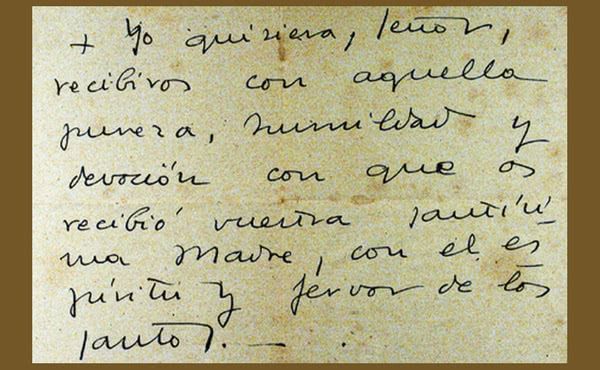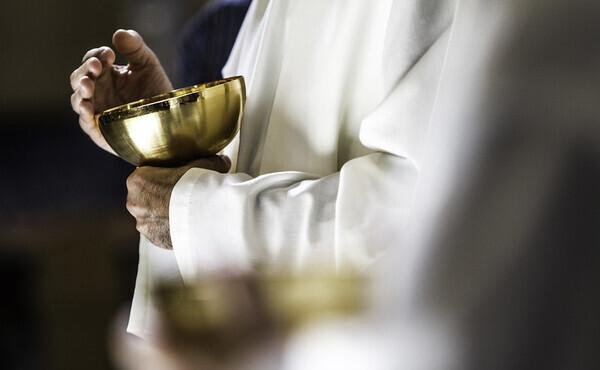On April 23, 1912, Saint Josemaria made his First Holy Communion. On that day “Jesus wished to make himself owner of my heart,” he recalled with gratitude years later.
In Communion we receive Jesus, but it is really He who receives us. We invite Him into our home, but it is He who receives us into His. He is our host. Our desires to receive Him are a pale reflection of His. We may pray a spiritual communion several times during the day, but his longing for intimacy with each of us is much more ardent: “I have earnestly desired to eat this passover with you before I suffer” (Lk 22:15).
We too want our hearts to burn with the desire to receive Him, to become one with Him. It is consoling to listen to the holy Cure of Ars words: “a spiritual Communion acts in the soul like a breath of wind on a burning ember that is about to go out. Whenever you feel your love for God growing cold, make a spiritual communion right away” (Saint John Mary Vianney, Sermons).
“Although He needs nothing, He never wants to be separated from us”
During these days, in many parts of the world we find ourselves in some form of quarantine. Perhaps some will not be able to leave their homes to attend Mass. In many places it has been necessary to suspend the public celebration of the Eucharist. But our Lord remains with us. Waiting for us. Longing for us. We pray that this situation may soon end and we will be able to unite our soul with His once again through sacramental Communion. We are worried that this forced absence may cool down our love. It may be that after so many years of receiving Him daily we see ourselves deprived for some weeks of his sacramental presence. This physical distancing can help us value much more the unmerited gift of frequent Communion, the tender closeness of a God who becomes bread and the silent service of priests who make Him present through their voices and actions.
These can be good days to appreciate to what extent God enjoys being with us, how ardently the eternal Lord awaits us. As Saint Josemaria said: “although He needs nothing, He never wants to be separated from us” (Christ is Passing By, no. 84).
Saints in ordinary life
The sanctity God wants to grant us is possible in the middle of the world, in the middle of the ordinary circumstances of each day. Perhaps not even the elderly can recall a situation like the one we are facing now. Nevertheless, it is now part of our “ordinary life.” God wants us to seek Him precisely there. It would not be good to seek Him in what is extraordinary, in the risk of going out to the street if what is prudent is to stay home. To obey our parents, or perhaps our children, or the doctors, and of course, the health authorities, are attitudes proper to those seeking sanctity. We need to strive to live each moment with a peace that unites us with God.
Some of us don’t know how long we will be deprived of participation in the Eucharist, but we need to realize the value that our sincere desire to receive Him has in God’s eyes. Saint Josemaria has taught thousands of people throughout the world a prayer that he learned from a good Piarist priest: “I wish, my Lord, to receive you with the purity, humility, and devotion with which your most holy Mother received you, with the spirit and fervor of the saints.”

Saint Faustina Kowalska said Jesus himself hold her that if we pray a spiritual Communion several times a day, in only a month we will see our hearts completely changed. These weeks can be a marvelous opportunity to enlarge our hearts, to identify ourselves with God’s longings.
It is a very bold prayer because he expresses the wish to attain the highest summit any creature has reached. He wants his soul to be at the height of Mary’s, the blessed among all women. And he is eager to make his own the fervor of all the other saints. Everything seems little to him when it is a question of celebrating the presence of a Guest who merits everything. And God makes his desires effective. God cleans a soul that prays like this. To speak in a human way, God “enjoys” seeing how his Only-begotten Son and his adoptive son love one another. During these days we can make God happy by fulfilling our ordinary duties and praying this brief prayer frequently. It will help us find Him not only in the nearby but perhaps inaccessible Tabernacle, but also in the thousand small daily occurrences in our homes.
A prison of Love!
These are days to better understand the Heart of our God: “For twenty centuries He has been waiting there, willingly locked up, for me and for everyone” (The Forge, 827). When we find life alongside others trying, or when smiling isn’t easy, it will console us to realize He is awaiting us in his “prison of Love.” When we need to “tighten our belt” to come through this crisis, when sickness attacks us, or when boredom may come, it will console us to know that our Lord has not left us, that He is present in those who live with us, in those who are suffering or are simply afraid. When we have to study without any tests in view, or work online without a boss there to limit our time on the social media, when we need to put care into our work and finish each job well at home, it is vital to count on our Lord’s support, his closeness and affectionate encouragement. He makes our sufferings and longings His own, even before we experience them ourselves.
Saint Joseph is one of the saints who for months found nourishment in spiritual Communions. He dreamed of what the Child would be like and surely spoke with Mary about it. They were months of preparation, of longing to hold Him in their arms. Mary’s words were a breath that enkindled the flame of hope in her spouse. Joseph may have witnessed Mary telling the Child in her womb her eager desire to embrace and care for Him, singing to Him with the affection of the most loving Mother. Together they surely prepared the best reception possible for the Child, for God made man.
Even if we cannot receive Him sacramentally, we can still give thanks each day, after uniting ourselves through television or the internet to the Holy Mass, and praise Him for all his gifts, also for what we do not understand now.
Diego Zalbidea
